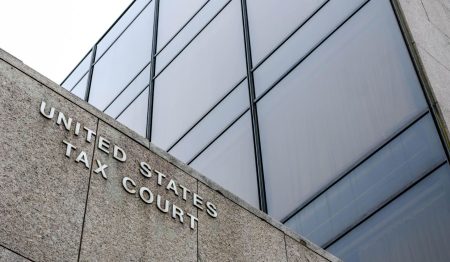Sanessa Griffiths of Skadden, Arps, Slate, Meagher & Flom LLP discusses the lack of diversity in the tax bar and recommends ways to fix it.
This transcript has been edited for length and clarity.
David D. Stewart: Welcome to the podcast. I’m David Stewart, editor in chief of Tax Notes Today International. This week: tax inclusive.
Historically, the tax bar has developed a reputation for lacking in diversity. In fact, a 2022 report by the American Bar Association found the Section of Taxation to be the least diverse across sexual orientation, gender, ethnicity, and race. Our guest today takes a look at that data and possible ways to address the issue.
This week’s episode is part of a series we’ve been doing examining how tax rules affect marginalized groups. We’ll include links in the show notes to our previous episodes on the intersection of tax and racial inequality, LGBTQ rights, feminism, diversity and international tax policy, tribal taxation, race-based tax weapons and wealth and inequality.
Here to talk more about this is Tax Notes legal reporter Caitlin Mullaney. Caitlin, welcome back to the podcast.
Caitlin Mullaney: Hi, Dave. Thank you so much for having me.
David D. Stewart: Now I understand you recently talked with someone about this. Could you tell us about your guest?
Caitlin Mullaney: Yes. I recently spoke with Sanessa Griffiths. She’s an associate at the Washington, D.C., office of Skadden. In addition to her work with high stakes and complex tax issues, Sanessa is active in her firm’s equity and inclusion initiatives, particularly regarding the hiring and retention of attorneys of color. She’s also a member of the Law Firm Antiracism Alliance Tax System Working Group.
David D. Stewart: And what issues did you get into?
Caitlin Mullaney: We discussed an article that Sanessa recently coauthored, “Diversity in the Tax Bar: Reflections on Lessons Learned and the Path Forward.” The article focuses on a series of panel discussions examining issues that have made it difficult to attract and retain diverse attorneys in the tax bar and recommendations for addressing those issues.
David D. Stewart: All right. Let’s go to that interview.
Caitlin Mullaney: Sanessa, first of all, welcome to the podcast.
Sanessa S. Griffiths: Hey, Caitlin. Thank you for having me here today.
Caitlin Mullaney: Your article summarizes six issues that have made attracting and retaining diverse attorneys into the tax bar difficult. Before we start looking at those, do you want to give us some background on the tax bar’s historical reputation of diversity?
Sanessa S. Griffiths: Absolutely. The lack of diversity within big law, particularly at the senior levels is widely known. The tax bar has historically been even less diverse, and because of that lack of diversity, particularly at the senior levels, underrepresented law students often shy away in favor of more general litigation or transactional practices because of a fear of specializing in a practice where they don’t see a clear path to success. So as we mentioned in the article, it’s a little bit of a perpetuating cycle.
Caitlin Mullaney: Do you think there’s been any increase in the representation of diverse groups over time?
Sanessa S. Griffiths: I think there has been, but it’s slow moving. A few of the efforts we’ve seen recently are organizations like the ABA creating fellowship programs to attract and integrate diverse groups into the tax bar. I am on the steering committee of one of those fellowships called the Loretta Collins Argrett Fellowship, and the goal of that fellowship is to identify, engage, and infuse historically underrepresented individuals into the tax section, creating a more accessible, equitable and inclusive pathway to section leadership and supporting expansion, diversification and inclusiveness of the tax profession by creating a space and sense of belonging for those looking to be more involved in the section.
In our first two years of that fellowship, we have been able to place fellows on committees in the tax section and have had them speak at the conference as experts in tax.
Caitlin Mullaney: Great. And your article references a 2022 American Bar Association report, which showed the ABA Section of Taxation having one of the lowest rankings of sexual orientation, gender, ethnic and racial diversity. What do you think separates it from other sections that rank higher in these areas?
Sanessa S. Griffiths: It’s a bit complicated, Caitlin. First, there’s a reputation among practitioners that the tax bar is not diverse. Unfortunately, diversity begets diversity, and so the fact that new entrants into tax practice don’t see persons above them means that they are less likely to enter the profession.
Secondly, there is a focus often in the marketplace that tax is focused on math. This perception as tax as a math-focused area of the law means that some people shy away for fear of dealing with numbers. Unfortunately, this misunderstanding leads many people to step away from tax in favor of more words-focused areas of law.
As with many other specialty practices, first-generation law students and particularly those that identify as racial minorities do not have the benefit of previous exposure to the legal practice before law school, which means during the recruiting process, many gravitate towards litigation.
Relatedly, many diverse attorneys entering the practice of law look for more accessible areas of practice, which means ones they’ve seen before. So areas like criminal litigation and civil litigation that they’ve seen on TV or ones that they may have experience with, like family law, when looking for an area to start practice.
Caitlin Mullaney: What do you think is the greatest difficulty the tax bar faces in attracting and retaining diverse attorneys?
Sanessa S. Griffiths: I think the greatest difficulty they face is really educating people on what it means to practice tax. I can speak from experience in saying that I didn’t exactly know what it meant to practice tax, and it wasn’t until my second year of law school that I had exposure to a tax class. Unfortunately, realizing what tax is as a 2L can often be too late when you’ve already sought out your summer internship program. So tax really needs to focus on letting people know early about what it could mean to practice tax.
Caitlin Mullaney: Now moving back to the article, you and the coauthors outline six top issues with attracting and retaining diverse attorneys into tax practice. Can you give us some background on the selection of these specific issues?
Sanessa S. Griffiths: Of course. The Law Firm Antiracism Alliance held a 10-part series about diversity in the tax bar. The virtual program was made available free of charge to attorneys and law students across the United States and was cosponsored by the Section of Taxation, the American College of Tax Counsel, and the American Tax Policy Institute.
Me and other associates at three firms were selected to be reporters on the series. While serving as reporters on the series, me and my coauthors noticed that the panelists coalesced around these six issues that have made the attraction and retention of diverse attorneys increasingly difficult. As reflected in the article, the panelists also pointed to common solutions for alleviating those issues.
Caitlin Mullaney: And can you give us a review of the six issues that were selected?
Sanessa S. Griffiths: Yes. So the six issues are [first], as I’ve mentioned a few times already, the public has a limited view of what tax is. Second, implicit bias and stereotype threat are present in the workplace, which may make diverse attorneys feel isolated while working in an already complex area. Third, diverse attorneys often lack mentorship and sponsorship that other attorneys may benefit from.
Fourth, diverse attorneys often do not receive the same quality assignments that their counterparts may receive. Fifth, diverse attorneys often do not receive adequate educational opportunities and professional development, which may have even started prior to entry into the workforce. And sixth, some diverse attorneys may feel pressure as the token member of their particular practice group.
Caitlin Mullaney: And with these issues, you mentioned that there were some recommendations and they were included in the article. Can you give us some information about these recommendations to address the issues?
Sanessa S. Griffiths: Of course. I think the first and one that I’ve probably mentioned twice already on the podcast is that there’s a lot of work to be done on educating the population on what it means to practice tax. It’s not just math focused, but there’s a social impact to tax that would be galvanizing for many young attorneys who see their work as lawyers as impacting the social net positive in the country.
Related to implicit bias and mentorship, there’s a role for all of us to play in our natural proclivities, to be around people that are like us, and particularly in the workplace, we may need to work against those natural inclinations in order to create an environment that allows for diversity and allowing others to feel included in those environments.
Related to assignments, there is a role for us all to play in making sure that assignments are provided equally to all associates or junior members of the team. As we know, whether or not you have quality assignments may be limiting as to what your future skills will be.
So employers having equal opportunities in that regard is essential, which they can do through HR, they could do through professional development staff to ensure that work is being provided equally among their ranks.
Lastly, particularly as it relates to being a token member of the community, there’s work for everyone to do in treating individuals as individuals. There’s already an intrinsic burden that many diverse attorneys feel to perform well for fear that their performance may be attributed to other members that look like them.
So creating an environment where diversity is celebrated and individualism is encouraged will help to release some of that internal pressure so that attorneys can focus on their work in the workplace [which] should be a priority.
Caitlin Mullaney: I know you’re active in your firm’s equity and inclusion initiatives, particularly regarding the hiring and retention of attorneys of color. Do you have any advice you’d like to share for firms wishing to institute similar initiatives?
Sanessa S. Griffiths: Absolutely. Law firms should embrace [diversity, equity, and inclusion] as a core value and make a commitment to activities such as mentoring and educating law students on the opportunities the practice of, in this case, tax law has to offer.
Personally, I’ve had the opportunity to help with our recruiting efforts and share my experience working in tax law to help excite the next generation of diverse law students about the opportunities available and the importance of bringing diversity to the practice of tax law.
For example, I will be co-teaching a tax course at Howard this spring. A number of my colleagues have served as adjuncts at local law schools, including Howard, which provides law students with early exposure to tax so that they can make a decision on whether or not they want to practice tax early in their legal career.
Caitlin Mullaney: Now, let’s go a little big picture. What are some of the benefits of increasing the diversity of the tax bar?
Sanessa S. Griffiths: Diversity produces more unique client solutions in a client-focused profession. Making them happy and providing them with the best solutions for their unique problems is a must. The practice of tax in particular requires creativity, and so homogeneity of thought is not beneficial.
It’s actually pretty simple. Diversity begets creativity. Further, and maybe this will resonate with people a little more, clients are asking and want to see diverse teams. This is primarily because they understand the benefit of bringing a variety of backgrounds and experience to their cases.
Caitlin Mullaney: And why does this change need to happen?
Sanessa S. Griffiths: In addition to the creativity we offer clients, the United States is a diverse place and the tax code in particular has been used to implement a number of social changes from child tax credits to energy credits. Attorneys that practice tax need to reflect the country that they’re serving in and have knowledge of the social implications of the code’s provisions that they’re working within. So in particular to tax diversity of the counsel that work in this area is essential to making sure the code reflects the needs of the country.
Caitlin Mullaney: Thank you so much, Sanessa. Well, sadly, that’s all the time we have for today. Again, I want to refer any interested people to Sanessa and her coauthors’ article. It’s titled “Diversity in the Tax Bar: Reflections on Lessons Learned and the Path Forward.”
Sanessa S. Griffiths: Thank you.
Read the full article here









